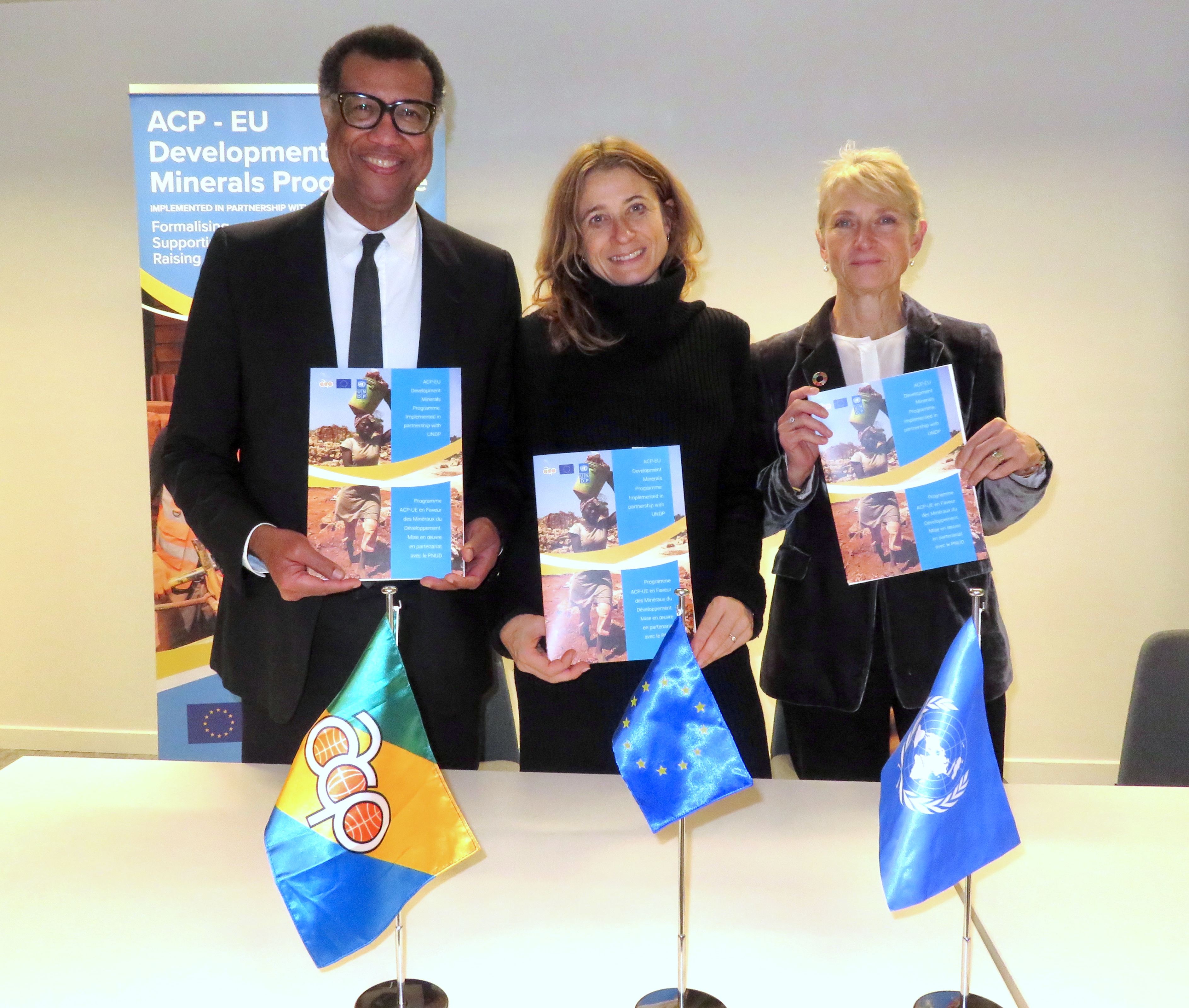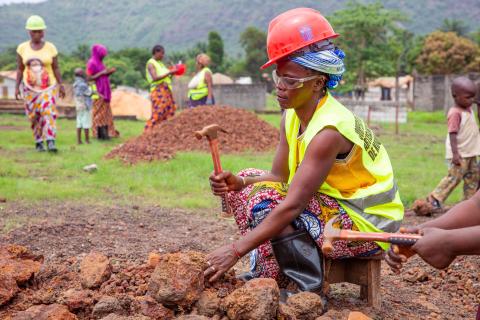UNDP, the European Union and the Organisation of African, Caribbean and Pacific States renew partnership on development minerals management
December 6, 2023

Junior Lodge, Assistant Secretary-General for Structural Economic Transformation and Trade, OACPS, Cécile Billaux, Head of Unit at the EC Directorate-General for International Partnerships and Camilla Brückner, Director of UN/UNDP office in Brussels renewed their partnership on the management of the development minerals in Africa, the Caribbean and the Pacific (ACP).
Brussels, 5 December 2023-- The UN Development Programme (UNDP), the European Union (EU) and the Organisation of African, Caribbean and Pacific States (OACPS) renewed today their partnership on the management of the development minerals in Africa, the Caribbean and the Pacific (ACP). These are minerals and materials that are mined, processed, manufactured and used in industries such as construction, manufacturing, infrastructure and agriculture, including the so-called critical minerals.
Launched in 2014, the ACP-EU Development Minerals Programme is an initiative of the Organisation of African, Caribbean and Pacific States (OACPS), financed by the EU and co-funded and implemented by UNDP. Through its interventions, it has put the previously neglected development minerals on the map, having created a conducive environment for improved small-scale mining, and demonstrated the inextricable link between the sector and sustainable development.
As the world renews efforts towards cleaner energy sources, the demand for critical minerals is increasing rapidly. This is also accompanied by the growth in demand for a broader group of development minerals, which is explained by drivers such as population growth, rapid urbanization, industrialization and the need for resilient buildings and infrastructure.

Countries in Africa, the Caribbean and the Pacific have the resources and the potential for a green transition and a circular economy that makes the most efficient use of these resources.
Artisanal and small-scale mining (ASM), a major producer of minerals, plays a key role in the green transition. However, artisanal miners largely remain informal and earn low incomes, often leading to a negative impact on the environment and become parties to social conflicts.
“Artisanal and small-scale mining plays an important role in many countries, triggering growth as well as investments in jobs, infrastructure and basic social services,” said Camilla Brückner, Director of UN/UNDP office in Brussels, during the signing ceremony. “Our partnership with the EU and OACPS helped improve the organization of and create an enabling environment for artisanal and small-scale miners that is sustainable from the economic, social and environmental standpoints. We look forward to continuing these joint efforts to foster a low-carbon and green economy that leaves no one behind.”
Currently, the programme is implemented Burkina Faso, Cameroon, Congo Republic, Jamaica, Fiji, Guinea, Suriname, Tanzania, Uganda, and Zambia. Over forty countries have previously benefited from the Development Minerals Programme’s support, with more to be covered by the new phase. The Programme also supports the institutional strengthening of the African Minerals Development Centre of the African Union.
“Minerals are critical for the green energy and digital transition. Thus, establishing strategic partnerships with natural resources-rich countries is an important aspect of the current EU geopolitical dimension, working together with our partners to promote sustainable investments in the extractives sector, while at the same time creating more jobs and added value at local level,” said Cécile Billaux, Head of Unit at the EC Directorate-General for International Partnerships. “In this context, through this partnership with OACPS and UNDP we will continue to support responsible mining practices that put local communities, such as artisanal and small-scale miners, at the forefront of inclusive participation in the sustainable mining and use of critical raw materials and in general of all those minerals and mineral processes that are required to decarbonize the economy.”
The institutions, policies and regulatory frameworks pertaining to development minerals have been improved in Cameroon, Fiji, Guinea, Jamaica, Uganda and Zambia while nearly 12 000 people have been trained on environmental management, health and safety, governance of cooperatives and business planning, and legal requirements from artisanal miners, among others. The programme supported the formalization of at least 325 artisanal and small-scale mining enterprises and cooperatives in Cameroon, Guinea, Uganda and Zambia, building their capacities and skills to access to markets.
“We continue to ensure that OACPS countries are supported to strengthen resilience to climate change shocks while also enhancing the livelihoods of the poorest in an inclusive and sustainable manner and advancing value-addition in OACPS countries. The new phase of the programme will enable more OACPS countries to benefit from the extensive experience garnered so far to leverage the use of minerals and materials to improve livelihoods and increase value-addition in OACPS countries in environmentally sustainable ways,” said Junior Lodge, Assistant Secretary-General for Structural Economic Transformation and Trade, OACPS.
In the new phase, the programme will focus on increasing incomes and competitiveness of artisanal and small-scale mining and mineral processing enterprises (ASMEs), supporting more inclusive and more sustainable development minerals value chains, as well as fostering the production of low-carbon materials and building resilience towards climate shocks.
Follow the Development Minerals Programme: Development Minerals | LinkedIn

 Locations
Locations



